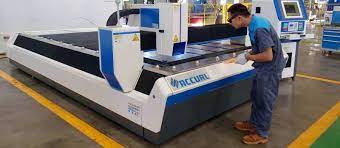What factors should you consider before buying the best CNC machine tool for your manufacturing jobs?
CNC machine tools range in size, function, and performance from vertical to horizontal milling machines and lathes to machining centers and multi-axis turning centers.
CNC machine tools are valuable assets in your manufacturing business because they are available in a variety of dimensions and axes, with varying levels of quality and automation.
Here are a few factors to consider when purchasing the right machine tool for your manufacturing needs.
- To begin with, you should understand the origins of the machine and its components, as cheaper is not always better.
Every field has competitors. Machine tool buyers will try to find the best machine for their needs at the lowest possible price wherever possible. Machines manufactured in technologically advanced countries have higher quality and durability and may be more expensive. However, these may have a longer lifespan and require less maintenance in the future.
Aside from the country of origin, consider where the parts are manufactured and assembled. Some machine tool manufacturers are based in countries with a strong engineering tradition, but their component parts are manufactured and assembled elsewhere.
- Second, be aware of your spare parts and maintenance costs.
Parts and maintenance costs are frequently overlooked. When selecting the right machine tool, you must consider the life cycle costs of your investment.
Because of the lower quality of its machine parts, a cheaper machine may cost more over its entire life span. Breakdowns can also be infuriating for machine operators and owners, resulting in missed opportunities and lost revenue.
- Third, think about the best machine type.
With such a diverse range of machine types available, you must choose the best fit for your manufacturing jobs.
Based on our decades of experience manufacturing and selling high-performance CNC machine tools, we have discovered that experienced customers typically consider the following factors before purchasing a machine:
- Dimensions, shapes, and materials of to-be-manufactured parts.
- Production cycles and turnaround time, for example, small batch processing vs large batch processing.
- Working space dimensions, such as table size, tool size, chuck size, and tool change time.
- Fixture length, width, and height, as well as the number of parts produced in a single cycle and the number of operations performed in a single setting.
- Tool capacity, machine spindle power, and machine performance.
- Automation level and machine control required.
- Compatibility with existing CAM software or design software.
- The number of machining axes used is determined by the complexity of the pieces to be manufactured.
- Machine flexibility, i.e., can it run other jobs if another machine fails?
- The machine’s cycle time
- Milling machines vs. turning machines
- The fourth point is that you should be aware of your project’s specifications.
Fourth, and perhaps most importantly, you must have a clear assessment of your current and future production needs in order to avoid purchasing an undersized or overspecified machine.
Consider the following questions:
- What parts and materials do I want the machine to make?
- What levels of precision will those parts require?
- How many axes will I require?
- How do I strike a balance between speed, accuracy, flexibility, and cost? In some cases, choosing a slower model may result in greater accuracy at a lower cost.
- What are the various sizes, complexity, and grades of materials with which I will be working?
- You can determine what performance and capabilities you will need as you progress to the next stage by asking yourself these questions.
- Lastly you should have a good understanding of the costs of CNC machine tools.
Machine purchases are frequently regarded as high investments by manufacturing companies, with CNC machine tool costs ranging from tens of thousands to hundreds of thousands of dollars.
When calculating your budget for your machine tool, take into account the options that you require. Most CNC machines include commonly used options, with additional options for selection and other costs required if greater manufacturing sophistication is required.
You must also consider the trade-offs between price, quality, and output. A lower-cost machine may be easier to swallow at first, but it may be incapable of providing the speed and performance that your business requires. Overpaying for features you do not need, on the other hand, can hurt your bottom line.



